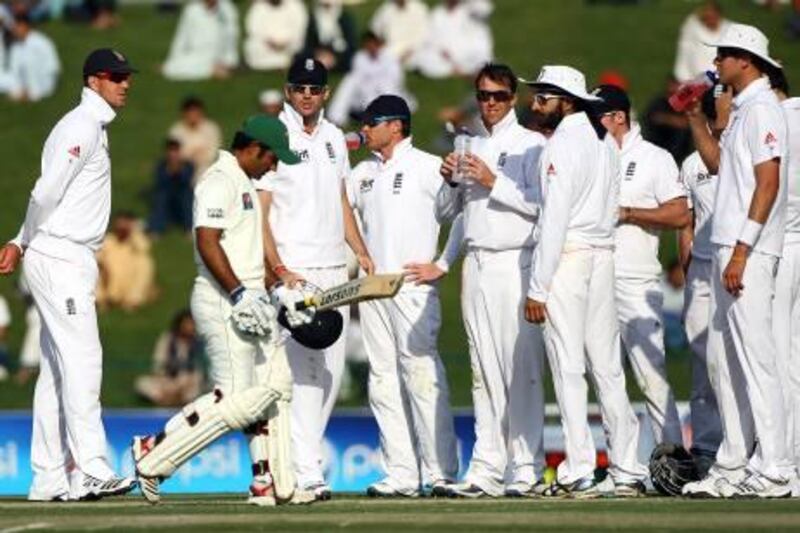Sportsmen are creatures of habit. Their happiness and success revolves around the regular execution of essentially repetitive behaviour. They prepare and train the same way in the hope, ideally, to play the same way and eventually succeed the same way, over and over and over again.
Naturally collective sporting behaviour follows on from this. Sides prefer to pick the same players, keep the same balance and play, broadly, the same way. Circumstances must be bowed to every now and again, of course, but drastic changes are avoided because they can throw a carefully built sporting equilibrium awry.
So, it is when habits are broken that matters become really interesting. Two choices before the first ball was even bowled at the Zayed Cricket Stadium in Abu Dhabi broke the repetition both Pakistan and England have thrived on over the past year (nearly three years in England's case).
In choosing Monty Panesar to replace the injured Chris Tremlett England went into a Test with two spinners in a four-man attack for the first time since December 2003 (against Sri Lanka at Kandy in case you were wondering) and that was a different time altogether, during their rise before the current rise. The last time they played two spinners at all was in July 2009, in the Ashes at Cardiff; that was the last time Panesar played.
Mostly the sharpness of their pace attack, with Graeme Swann as a high-quality spinning foil, has given them a balance that has not needed tinkering.
But they are now in the midst of an entirely different challenge and are starting a year in that they play in Sri Lanka and later, in India, at the end of which their status as the game's pre-eminent side will be properly gauged; this moment then had to come at some point this year, if not today.
Pakistan, on the other hand, won the toss and chose to bat.
That statement of fact is out of the ordinary in the context of no other captain than Misbah-ul-Haq. Misbah is not a bat-first kind of captain. Of the eight tosses he has won as captain including here, he has bowled first in six of them. It is often derided as a defensive tactic, which is to miss two points.
One, bowling first on winning the toss has traditionally been seen as a statement of intent, of getting stuck into the opposition and setting the game's tone.
It is only in this time of blast-away openers that thinking has changed.
The other is an already well-worn argument with no definitive answer. To some Misbah is overly defensive, to others merely realistic. His bowling is his stronger suit and if they have a good first day, as they often have done under him, it eases the pressure off his batsmen.
But in deciding to bat first, on a surface that looked to be helping spin to various degrees through the day – lots in the morning, not so much through the afternoon, and more again as the day ended – he broke his own mould.
Did the rejig work for either side? A scorecard that reads 256 for seven is neither proof of resounding success nor resounding failure for either decision.
England adjusted well to their task, and could have had more to show for it had they not dropped four catches.
Panesar started what he called his "second debut" well, though the threat he posed in the morning receded as the day wore on. He should have had more wickets, Misbah's drop on 30, a particularly frustrating moment.
It was, in fact, Swann who looked a little askew in this new formation.
For so long England's premier spinner, and the best in the world, as well as a firm advocate of playing two spinners in his side, he never got his lengths quite right, though his skill meant he still ended with three wickets, two of which were befitting of a man of his rank.
And only in the morning did the pair bowl well together in tandem, an essential requirement of any such strategy.
In one sense, that Stuart Broad was England's most consistent threat actually muddies the case for their selection.
But, and this is the beauty of a five-day game, the value of breaking these habits can only be assessed definitively at the game's denouement.
Misbah's call to bat first, in particular, was based on his assessment of the wicket and will become clearer as the game wears on.
As Pakistan later said, they probably lost two too many wickets, but avoiding batting last on a surface that becomes friendlier to spin might become the more vital call.





